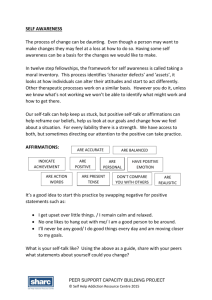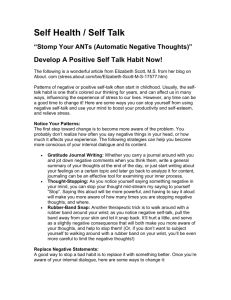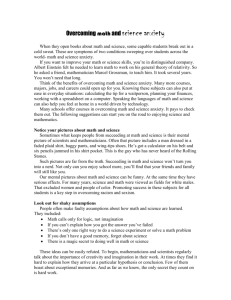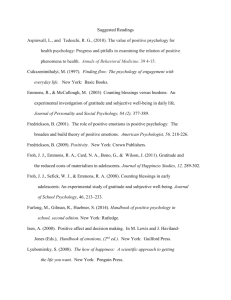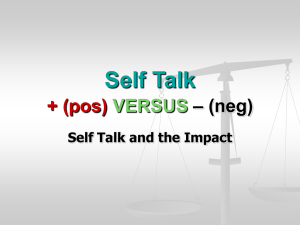CommonHealth Weekly Email 08 26 13 The Power of Positive Talking
advertisement
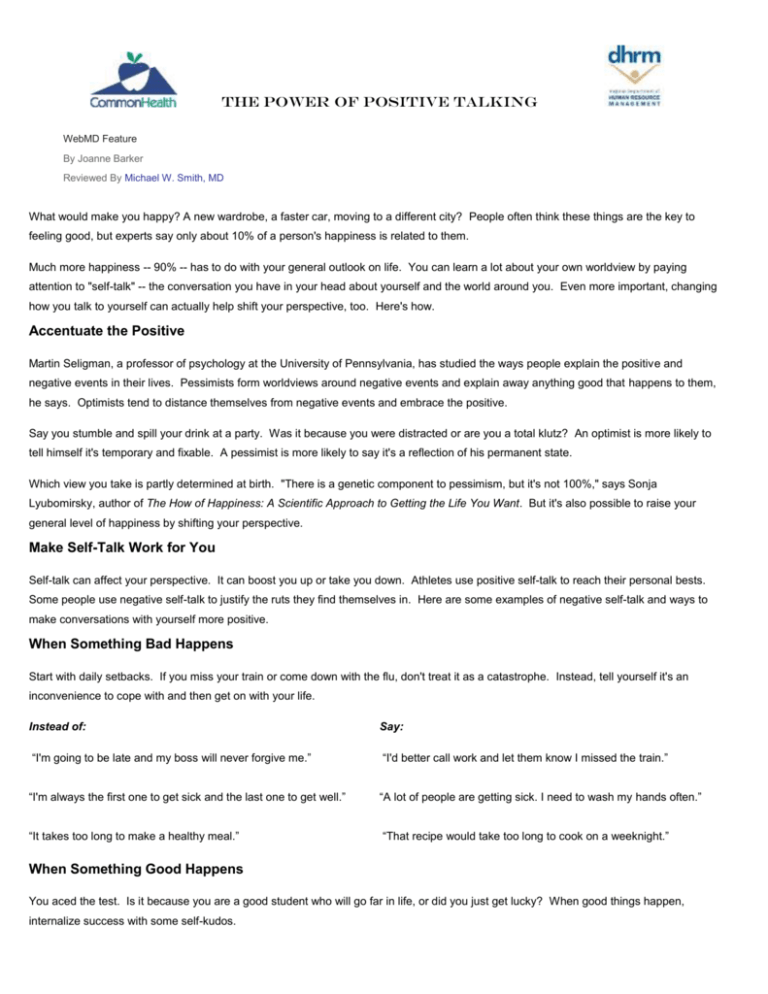
The Power of Positive TaLking WebMD Feature By Joanne Barker Reviewed By Michael W. Smith, MD What would make you happy? A new wardrobe, a faster car, moving to a different city? People often think these things are the key to feeling good, but experts say only about 10% of a person's happiness is related to them. Much more happiness -- 90% -- has to do with your general outlook on life. You can learn a lot about your own worldview by paying attention to "self-talk" -- the conversation you have in your head about yourself and the world around you. Even more important, changing how you talk to yourself can actually help shift your perspective, too. Here's how. Accentuate the Positive Martin Seligman, a professor of psychology at the University of Pennsylvania, has studied the ways people explain the positive and negative events in their lives. Pessimists form worldviews around negative events and explain away anything good that happens to them, he says. Optimists tend to distance themselves from negative events and embrace the positive. Say you stumble and spill your drink at a party. Was it because you were distracted or are you a total klutz? An optimist is more likely to tell himself it's temporary and fixable. A pessimist is more likely to say it's a reflection of his permanent state. Which view you take is partly determined at birth. "There is a genetic component to pessimism, but it's not 100%," says Sonja Lyubomirsky, author of The How of Happiness: A Scientific Approach to Getting the Life You Want. But it's also possible to raise your general level of happiness by shifting your perspective. Make Self-Talk Work for You Self-talk can affect your perspective. It can boost you up or take you down. Athletes use positive self-talk to reach their personal bests. Some people use negative self-talk to justify the ruts they find themselves in. Here are some examples of negative self-talk and ways to make conversations with yourself more positive. When Something Bad Happens Start with daily setbacks. If you miss your train or come down with the flu, don't treat it as a catastrophe. Instead, tell yourself it's an inconvenience to cope with and then get on with your life. Instead of: Say: “I'm going to be late and my boss will never forgive me.” “I'd better call work and let them know I missed the train.” “I'm always the first one to get sick and the last one to get well.” “A lot of people are getting sick. I need to wash my hands often.” “It takes too long to make a healthy meal.” “That recipe would take too long to cook on a weeknight.” When Something Good Happens You aced the test. Is it because you are a good student who will go far in life, or did you just get lucky? When good things happen, internalize success with some self-kudos. Instead of: Say: "I got a raise -- now they're going to expect me to do more work.” "I'm a valuable employee and I deserve this raise." "She thinks I'm cute? She needs to get her glasses checked.” "I'm going to ask her out and I bet she'll say yes." "You're just saying you like the meal." "I'm a great cook." In Social Situations Negative self-talk can be rife in social situations, especially if you feel nervous or "on display." Positive self-talk can help you put social gaffes in proper perspective. Instead of: Say: “I'm never comfortable at parties.” “I felt awkward at the party but I met some interesting people.” "I always stuff my face." "I have trouble controlling myself around candy." "I have no focus." "I find it more difficult to focus when I'm tired." Keep at It The process of shifting your language is a lot like getting in shape. "If your muscles haven't been worked in a while, guess what? It's going to be uncomfortable at first," Beneduce says. Over time, negative words can take on the quality of a broken-in pair of jeans -- they just seem to fit. And some pessimists don't want to look on the bright side, Lyubomirsky says. "They think it would be deceiving themselves." Adopting a more positive language and worldview can pay off, however. People who focus on the present and appreciate what they have today are more happy, energetic, and hopeful. Happiness opens your mind to new possibilities, creative thinking, and interest in social situations. Happier thoughts could give you fewer things to feel bad about. SOURCES: Franco Beneduce, certified life coach and group facilitator, San Francisco, Calif. Harker, L. Journal of Personality and Social Psychology, January 2001. Lyubomirsky S. Emotion, April 2011. Lyubomirsky, S. The How of Happiness: A Scientific Approach to Getting the Life You Want, Penguin Press, 2007. Sonja Lyubomirsky, PhD, professor of psychology, University of California, Riverside. McCullough M. Journal of Personality and Social Psychology, January 2002. Mellalieu, S. Advances in Applied Sport Psychology: A Review, Routledge, 2009. Seligman, M. Learned Optimism: How to Change Your Mind and Your Life, Vintage Books, 2006. www.commonhealth.virginia.gov The contents of the CommonHealth weekly emails may be reprinted from an outside resource in the area of health, safety, and wellness and is intended to provide one or more views on a topic. These views do not necessarily represent the views of the Commonwealth of Virginia, CommonHealth, or any particular agency and are offered for educational purposes. If you have questions or concerns about this article, please email us at wellness@dhrm.virginia.gov
